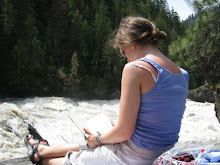Thursday, February 11, 2010
Ishmael
One of the required courses for all environmental studies majors is a class called Nature & Society. The syllabus describes the course as one that "explores how the relationship between human societies and the natural world has been influenced throughout history by various thinkers and ideas. We also consider how nature itself and our ability to manipulate it has influenced society, and in turn, environmental thought."
Our first major reading assignment and essay was the aforementioned Ishmael by Daniel Quinn. If you haven't yet read this book, go borrow it, buy it, download it illegally off the internet, whatever. It is probably faster and more clear to actually read it than to try and interpret a summary. And agree with Quinn's argument or not, Ishmael raises fascinating questions about our culture in relation to the planet. Published in 1993, it is also interesting to compare what was then "radical environmentalism" to the environmental movement of today.
Quinn, in a perhaps oversimplified manner, separates the world into Leaver Cultures ("primitive populations") and Taker Cultures ("civilized populations"). Taker culture, beginning with the widespread acceptance of agriculture, tells us "the world was made for man, and man was made to rule it". Leaver culture, on the other hand, is based on the premise "man belongs to the world". Quinn argues that those in Taker culture are trying to enact a story that puts them at war with the world. To stop destroying the planet (and ultimately destroying ourselves), we have to create a new story to take part in.
I will spare you the six page critical essay. However, one point towards the end especially struck me. The different forms of life aren't done evolving, including humans. If allowed to progress naturally, other forms of life could attain the level of intelligence we think makes us so special. The book reads,
"All sorts of creatures on this planet appear to be on the verge of attaining that self-awareness and intelligence. So it's definitely not just humans that the gods are after. We were never meat to be the only players on this stage. Apparently the gods intend this planet to be a garden filled with creatures that are self-aware and intelligent."
"So it would appear And if this is so, then man's destiny would seem to be plain."
"Yes. Amazingly enough, it is plain -- because man is the first of all these. He's the trailblazer, the pathfinder. His destiny is to be the first to learn that creatures like man have a choice."
As I first read this passage, I think my jaw may have actually, physically, dropped. How had I never thought of this before? I believe in the science that backs up Darwinian evolution. I think the earth is billions, not thousands of years old. I do not have fundamental Christian religious views. So why have I always just assumed that humans would ever be the only creatures to make moral choices and self-aware decisions? If humans evolved to develop intelligence, culture, and reason, why should we be the only species to do so? Without even realizing it, I had been assuming that creation had culminated with humankind.
It makes me wonder how many other revelations are out there, just beyond my periphery. What else is "Mother Culture" (as Quinn calls it) hiding from me?
Labels:
book
Subscribe to:
Post Comments (Atom)

Sadie has evolved. She knows she can't get on the couch unless invited...or if no one is looking. She makes the conscious choice daily not to eat us. Because, she could.
ReplyDeleteHeyyy,
ReplyDeleteI somehow stumbled upon your blog through facebook stalking or something like that.
I've been intending to read Ishmael for like the past three years or so, too many other books got in the way, but I might have to bump it back to the top of my to-read list after reading this post....
Anyway. Thought I'd leave a comment and say yo!